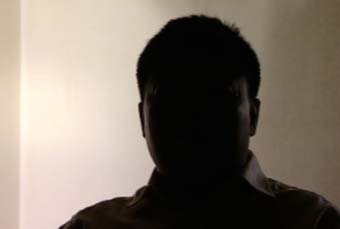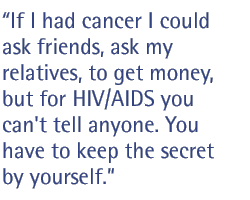
"Thomas" [not his real name] was interviewed for "The Age of AIDS" in China in April 2005. Though he was too nervous to show his face on camera, he told the crew about how his father spent his life savings on antiretroviral drugs, how the shelter he runs for HIV-positive homeless people was kicked out of a neighborhood three times in three months, and he says that despite growing education campaigns, the Chinese public still thinks HIV only happens to bad people. He predicts, "If the stigma and discrimination continue existing in society, [they will] fuel the epidemic."
Explain why we are filming you so that our audience cannot see your face.
I had an experience two years ago when I was running a shelter for homeless people living with HIV and AIDS. When the neighborhood found out who we were and what we were doing there, we were kicked out three times in the first three months. So I don't want to lose the place to live in the city and be forced to move from one place to another. Also, some of my relatives still don't know my status.
What would happen if you did tell them? What would be their reaction?
If I tell them, it might happen that we won't be in touch anymore. I might feel very upset if people know my status and start to refuse to get in touch with me. I would feel lost.

... [You had a different career before you got sick. What was it?]
I was working in the National Trading Company, and I had been working in the country offices in Cambodia, Thailand and Vietnam. I was in business. After I got sick, I returned to China, and when I started to recover, my boss and my friends called me again and wanted me to go back to work. Even after I told them I had AIDS, they still accepted me. It's very supportive to me. They came to visit me also.
But from my own experience, I feel that people living with HIV and AIDS in China need support, especially peer support among the community. So I started working on HIV/AIDS issues, and my focus is providing support and care among the people living with the disease so we can share our emotions, share our experiences and support each other to improve our quality of life. Also, now [we've started to advocate] for the rights of HIV-positive people to access treatment. ...
[Where does the stigma against HIV-positive people come from?]
The stigma comes from the people thinking [HIV/AIDS happens to] the bad people.
Has the government had any success trying to break down that stigma?
The government is trying a lot. The prime minister [Wen Jiabao] and the president [Hu Jintao] went to the hospital and shook hands with people living with HIV and AIDS. All these efforts have been made. But to take off the kind of stigma and discrimination from the whole society takes a long time, so it still needs a lot of effort.
How does the government deal with HIV-positive people now?
Usually when people are diagnosed HIV positive, they will be referred to do CD4 testing. According to the Chinese government treatment guidelines, if the CD4 [count] is under 200, then they will start to see if they are eligible for the ARV [antiretroviral] treatment. Of course they need to use their identity card to register, and then they can start to [have] access to the free ARVs. But in different parts of China they have different procedures.
I recently heard in [one] province, they need people living with HIV/AIDS to prove that they don't have money to afford the treatment. Then they will do an assessment and then decide if you are eligible or not for the free treatment. But in some provinces it's much easier.
... You're on ARVs yourself. Are you part of the government program?
At the moment, I receive treatment under the Médicins Sans Frontières [MSF; Doctors Without Borders] program since 2003. I was lucky to be brought into the program. ...
Tell the story of how you originally got on treatment and when you first [got] sick. How did you do that?
When I was sick, it was 2000. I was overseas, and then I spent almost all my money on treatment, and then finally the treatment did not work, so I had to return to China. Three months after I returned to China, I was diagnosed as HIV positive. ... My CD4 [count] was only 19, in the very late stage of AIDS, so then I was lucky that in 2000, HIV/AIDS treatment was introduced in Beijing.
I went to Beijing to start my treatment, and by that time it cost more than $1,000 per month for HIV treatment. My family sold almost everything to save my life. I started my HIV treatment in January 2001, and then I continued my treatment for about six months, and then my family could not support me anymore.
How did the treatment work?
It was good. I recovered rapidly, and then my CD4s started increasing, but [I worried about the] consistency of treatment. I tried many things to find the resources, and I tried to find a job, which only [paid] about $200 a month, but I need to work four or five months to get one month of HIV treatment. It seemed hopeless at that time, but finally I was very lucky.
I was on the Internet to reach an Indian doctor from New Delhi, and he's the one who helped me to get the generic drugs from India. The first time -- I haven't met this doctor -- was in July 2001. I put U.S. [currency] in an envelope and sent it to someone I had never met, and then a month later he sent me the HIV drug supply. It saved my life.
By the year 2003, [I got myself on the MSF] program, and they started to supply me with ARVs and provide treatment to me.
When you were diagnosed, were you surprised? Did you suspect that you might have it?
Because I'd been sick for such a long time, I had been thinking over all different kinds of diseases, like cancer. Of course I thought about AIDS also, but didn't really want to accept that I had AIDS. And also, like most Chinese people, I always considered [that it's] the bad people who caught this kind of disease, and I considered myself a good person, so I shouldn't have been infected.
Finally, when I was diagnosed, I was a little bit shocked, but more hopeless and disappointed. By that time I [thought] that I would die very soon because I didn't know the treatment was available, and also I knew I didn't have any money. When I first heard that the treatment is available, I was told that it cost more than $10,000, which is about 100,000 [yuan] per year.
If I had cancer I could ask friends, ask my relatives, to get money, but for HIV/AIDS, you can't tell anyone. You have to keep the secret by yourself. So I was very lucky. I had my father use all his life savings to put me on treatment.
So you told your father?
I had to, because he kept asking me, "Why don't you go to the hospital for treatment?" I had no explanation, so finally I had to tell. I told him that I'm hopeless, and he asked, "Why?" I said, "I have AIDS." He was shocked, but he never gave up. Like most of the HIV-positive people, their family members never gave up supporting them. So after spending all the money in the family, I started to recover and got well and went back to work. ...
What is at stake for China, in your view, if the epidemic isn't brought under control?
... The government has admitted [that] more than 1 million people have been infected, ... so the epidemic still continues. And if the stigma and discrimination continue existing in the society, [they will] fuel the epidemic.
